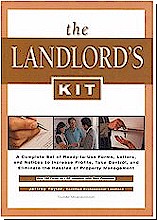Title: A Landlord's Most Important Decision Is? Author: Steve Norton Article: The most important decision any landlord makes is deciding who can live in their property. Who will you, as the owner, allow to live in your investment? This decision is so vital to the profitability of any property investment business and affects the business on so many levels that it's amazing that some landlord don't have a formalised procedure to protect themselves from making bad decision. Let's think about what we're actually doing when we rent a property. Instead of thinking of the property as a monthly income generator think of it as a pile of cash. Cash you have tied up in the deposit and purchasing costs. Cash you hope to gain a regular income from through renting and more cash that you'll receive if you sell the property and realise your capital gains. (Assuming house prices have risen since you purchased). If you include in this the value you place on your time spend finding the property, buying and arranging the rental then we have a very serious investment on our hands indeed. Now, imagine all that money in real, tangible terms, stacked up in a room in the house and then consider we hand over the keys to someone and say, "See you next year". Now we can begin to see how important it is to select the right tenant. Of course, I'm being dramatic and we do have legal safe guards but I hope that by considering your investment in terms of hard cash (like a professional investor) then you'll treat the question of occupancy very seriously. There's more to it than just financials. Not only are we trusting the tenant to look after our investment but we're also investing our free time with them. What do I mean? If we are managing the property ourselves and not using a letting agent then we have made a serious commitment in time to look after that tenant. If you have a tenant who does not appreciate your property or does not treat it with care and respect then you run the risk of losing your evening and weekends in maintenance and management tasks. What about rent collection? An unreliable tenant who does not pay on time creates stress and worry. Legal protection lets us all sleep better at night but the practicalities of recouping money and legal costs are a headache we do not need and one that's very avoidable. Once we know how seriously we need to take the task of finding the correct tenant we can start looking for the very best people. In this case 'best' has two simple criteria. 1) They pay on time and in full 2) They look after the property as if it were their own. I'm going to discuss three tools we can use to help find good tenants. The first is a long and very comprehensive application form. I ask for as much detail as possible from the tenant. I need all their contact details, ID, proof of current address such as telephone or electric bills, previous addresses and, perhaps most importantly, references from their employer, previous landlord (if they're moving out of home I'll ask for their parents' contact details) and a character reference from a recognised member of the community such as a Doctor or Teacher. Importantly, I always act on these references. I will check with whomever they have given to make sure the details are correct and they can vouch for the applicant. Secondly, I ask for a larger deposit than the usual 4 weeks rent. Typically I ask for 6 weeks rent (UK law give the tenant an automatic option to sublet if the deposit is too excessive, say more than 8 weeks rent). Paying more upfront is usually a good sign that they are serious. Finally, I have to feel comfortable about the people. If I can get along with them when the property is viewed and when we talk on the telephone and if I don't have any intuitive alarm bells going off then I trust my own judgement. At this point you might be wondering about a credit check? Yes this is a great tool depending on the affluence of your potential tenants. Some of my properties are let to people on social security benefits, many of whom I've had to help set up a bank account even. In these cases a credit check would not be beneficial but for better off tenants it can be a worth while exercise. Once we know how to approach the subject of finding great tenants we can consider why people make poor letting decisions. In my experience the worst decisions about tenants are made in pressure situations. An empty property is very damaging to the bottom line of a landlord. If a property is unoccupied it's very tempting to let the first person who comes along have the tenancy. I know, I've made the mistake myself (several times I'm reluctant to admit). This situation is exacerbated if you find your property is not in demand. If you only get one phone call from your advert in the local paper then you're putting pressure on yourself and your business. Therefore, the best way to make a good decision is to have a lot of people to choose from. Creating a big list of possible tenants comes from good advertising with good descriptions of you property and its selling points, realistic pricing (even undercutting competition in a renter market) and building a solid reputation as a landlord. About the author: Steve Norton is a landlord with 9 years of experience and owns properties in the UK and Australia. With a clear focus on making the landlord's life as easy as possible while maximising profit more of Steve's insider tips on landlording can be found at <a href="http://www.property-management-secrets.co.uk/"> http://www.property-management-secrets.co.uk/</a>
|
